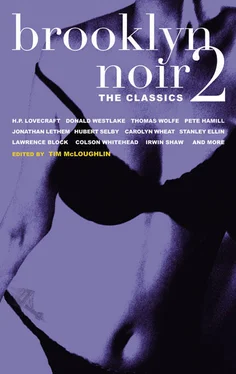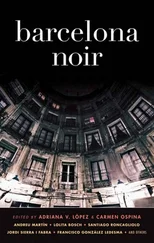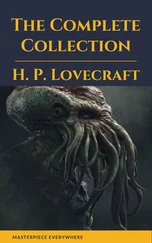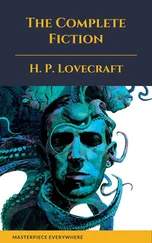H. Lovecraft - Brooklyn Noir 2
Здесь есть возможность читать онлайн «H. Lovecraft - Brooklyn Noir 2» весь текст электронной книги совершенно бесплатно (целиком полную версию без сокращений). В некоторых случаях можно слушать аудио, скачать через торрент в формате fb2 и присутствует краткое содержание. Год выпуска: 2005, ISBN: 2005, Издательство: Akashic Books, Жанр: Детектив, на английском языке. Описание произведения, (предисловие) а так же отзывы посетителей доступны на портале библиотеки ЛибКат.
- Название:Brooklyn Noir 2
- Автор:
- Издательство:Akashic Books
- Жанр:
- Год:2005
- ISBN:978-1888451764
- Рейтинг книги:4 / 5. Голосов: 1
-
Избранное:Добавить в избранное
- Отзывы:
-
Ваша оценка:
- 80
- 1
- 2
- 3
- 4
- 5
Brooklyn Noir 2: краткое содержание, описание и аннотация
Предлагаем к чтению аннотацию, описание, краткое содержание или предисловие (зависит от того, что написал сам автор книги «Brooklyn Noir 2»). Если вы не нашли необходимую информацию о книге — напишите в комментариях, мы постараемся отыскать её.
Brooklyn Noir 2 — читать онлайн бесплатно полную книгу (весь текст) целиком
Ниже представлен текст книги, разбитый по страницам. Система сохранения места последней прочитанной страницы, позволяет с удобством читать онлайн бесплатно книгу «Brooklyn Noir 2», без необходимости каждый раз заново искать на чём Вы остановились. Поставьте закладку, и сможете в любой момент перейти на страницу, на которой закончили чтение.
Интервал:
Закладка:
“Pretty straightforward case,” said the M.E. “On the surface, anyway. Our man here was poisoned, felt the effects coming on, went to the typewriter to tell us who’d done it to him, and died. A used glass and a small medicine bottle were on the dresser. We’ll check them out, but they almost certainly did the job.”
“Did he manage to do any typing before he died?” asked Crawley.
The M.E. shook his head. “Not a word. The paper was in the machine kind of crooked, as though he’d been in a hurry, but he just wasn’t fast enough.”
“He wasted his time,” said Crawley. “The guy confessed right away.”
“The one over there with the patrolman?”
“Uh huh.”
“Seems odd, doesn’t it?” said the M.E. “Take the trouble to poison someone, and then run out and confess to the first cop you see.”
Crawley shrugged. “You can never figure,” he said.
“I’ll get the report to you soon’s I can,” said the M.E.
“Thanks, Doc. Come on, Abe, let’s take our pigeon to his nest.”
“Okay,” said Levine, abstractedly. Already it felt wrong. It had been feeling wrong, vaguely, ever since he’d caught that glimpse of something in Perkins’s eyes. And the feeling of wrongness was getting stronger by the minute, without getting any clearer.
They walked back to Tanner and Perkins, and Crawley said, “Okay, Perkins, let’s go for a ride.”
They walked back to Tanner.
“You’re going to book me?” asked Perkins. He sounded oddly eager.
“Just come along,” said Crawley. He didn’t believe in answering extraneous questions.
“All right,” said Perkins. He turned to Tanner. “Would you mind taking my books and records back to the library? They’re due today. They’re the ones on that chair. And there’s a couple more over in the stack of Al’s records.”
“Sure,” said Tanner. He was gazing at Perkins with a troubled look on his face, and Levine wondered if Tanner felt the same wrongness that was plaguing him.
“Let’s go,” said Crawley impatiently, and Perkins moved toward the door.
“I’ll be right along,” said Levine. As Crawley and Perkins left the apartment, Levine glanced at the titles of the books and record albums Perkins had wanted returned to the library. Two of the books were collections of Elizabethan plays, one was the New Arts Writing Annual, and the other two were books on criminology. The records were mainly folk songs, of the bloodier type.
Levine frowned and went over to Tanner. He asked, “What were you and Perkins talking about before we got here?”
Tanner’s face was still creased in a puzzled frown. “The stupidity of the criminal mind,” he said. “There’s something goofy here, Lieutenant.”
“You may be right,” Levine told him. He walked on down the hall and joined the other two at the door.
All three got into the front seat of the Chevy, Crawley driving again and Perkins sitting in the middle. They rode in silence, Crawley busy driving, Perkins studying the complex array of the dashboard, with its extra knobs and switches and the mike hooked beneath the radio, and Levine trying to figure out what was wrong.
At the station, after booking, they brought him to a small office, one of the interrogation rooms. There was a bare and battered desk, plus four chairs. Crawley sat behind the desk, Perkins sat across the desk and facing him, Levine took the chair in a corner behind and to the left of Perkins, and a male stenographer, notebook in hand, filled the fourth chair, behind Crawley.
Crawley’s first questions covered the same ground already covered at Gruber’s apartment, this time for the record. “Okay,” said Crawley, when he’d brought them up to date. “You and Gruber were both doing the same kind of thing, living the same kind of life. You were both unpublished writers, both taking night courses at Columbia, both living on very little money.”
“That’s right,” said Perkins.
“How long you known each other?”
“About six months. We met at Columbia, and we took the same subway home after class. We got to talking, found out we were both dreaming the same kind of dream, and became friends. You know. Misery loves company.”
“Take the same classes at Columbia?”
“Only one. Creative Writing, from Professor Stonegell.”
“Where’d you buy the poison?”
“I didn’t. Al did. He bought it a while back and just kept it around. He kept saying if he didn’t make a good sale soon he’d kill himself. But he didn’t mean it. It was just a kind of gag.”
Crawley pulled at his right earlobe. Levine knew, from his long experience with his partner, that that gesture meant that Crawley was confused. “You went there today to kill him?”
“That’s right.”
Levine shook his head. That wasn’t right. Softly, he said, “Why did you bring the library books along?”
“I was on my way up to the library,” said Perkins, twisting around in his seat to look at Levine.
“Look this way,” snapped Crawley.
Perkins looked around at Crawley again, but not before Levine had seen that same burning deep in Perkins’s eyes. Stronger, this time, and more like pleading. Pleading? What was Perkins pleading for?
“I was on my way to the library,” Perkins said again. “Al had a couple of records out on my card, so I went over to get them. On the way, I decided to kill him.”
“Why?” asked Crawley.
“Because he was a pompous ass,” said Perkins, the same answer he’d given before.
“Because he got a story accepted by one of the literary magazines and you didn’t?” suggested Crawley.
“Maybe. Partially. His whole attitude. He was smug. He knew more than anybody else in the world.”
“Why did you kill him today? Why not last week or next week?”
“I felt like it today.”
“Why did you give yourself up?”
“You would have gotten me anyway.”
Levine asked, “Did you know that before you killed him?”
“I don’t know,” said Perkins, without looking around at Levine. “I didn’t think about it till afterward. Then I knew the police would get me anyway — they’d talk to Professor Stonegell and the other people who knew us both and I didn’t want to have to wait it out. So I went and confessed.”
“You told the policeman,” said Levine, “that you’d killed your best friend.”
“That’s right.”
“Why did you use that phrase, best friend, if you hated him so much you wanted to kill him?”
“He was my best friend. At least, in New York. I didn’t really know anyone else, except Professor Stonegell. Al was my best friend because he was just about my only friend.”
“Are you sorry you killed him?” asked Levine.
This time, Perkins twisted around in the chair again, ignoring Crawley. “No, sir,” he said, and his eyes now were blank.
There was silence in the room, and Crawley and Levine looked at one another. Crawley questioned with his eyes, and Levine shrugged, shaking his head. Something was wrong, but he didn’t know what. And Perkins was being so helpful that he wound up being no help at all.
Crawley turned to the stenographer. “Type it up formal,” he said. “And have somebody come take the pigeon to his nest.”
After the stenographer had left, Levine said, “Anything you want to say off the record, Perkins?”
Perkins grinned. His face was half-turned away from Crawley, and he was looking at the floor, as though he was amused by something he saw there. “Off the record?” he murmured. “As long as there are two of you in here, it’s on the record.”
“Do you want one of us to leave?”
Perkins looked up at Levine again, and stopped smiling. He seemed to think it over for a minute, and then he shook his head. “No,” he said. “Thanks, anyway. But I don’t think I have anything more to say. Not right now anyway.”
Читать дальшеИнтервал:
Закладка:
Похожие книги на «Brooklyn Noir 2»
Представляем Вашему вниманию похожие книги на «Brooklyn Noir 2» списком для выбора. Мы отобрали схожую по названию и смыслу литературу в надежде предоставить читателям больше вариантов отыскать новые, интересные, ещё непрочитанные произведения.
Обсуждение, отзывы о книге «Brooklyn Noir 2» и просто собственные мнения читателей. Оставьте ваши комментарии, напишите, что Вы думаете о произведении, его смысле или главных героях. Укажите что конкретно понравилось, а что нет, и почему Вы так считаете.












